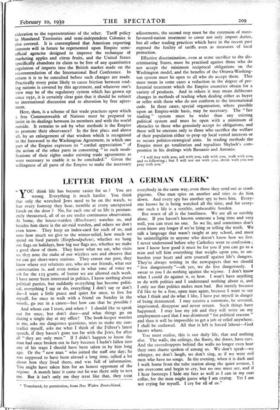LETTER FROM A GERMAN CLERK*
,TOU think life has become easier for us ? You are wrong. Everything is much harder. You think that only the wretched Jews need to be on the watch, to fear every footstep they hear, tremble at every unexpected knock on the door ? No, for each one of us life is perman- ently threatened, all of us are under continuous observation. At home, the house-warden (Blockwart) watches us, and besides him there is the air-raid warden, and others we don't even know. They keep an index-card for each of us, and note how much we give to the winter-relief, how much we spend on food parcels (Einpfundpakete), whether we hang out flags on holidays, how big our flags are, whether we make a good show of them. They know what we eat, who visits us, they note the make of our wireless sets and observe that we can get short-wave stations. They censor our post, they know where our relations are, who are our friends, what our conversation is, and even notice in what tone of voice we ask for the 125 grams. of butter we are allowed each week. I have never been interested in politics, I know nothing about political parties, but suddenly everything has become politi- cal, everything I say or do, everything I don't say or don't. do—I want a little peace and quiet for once, to live for myself, for once to walk with a friend on Sunday in the woods, go out in a canoe—but how can that be possible ?
And whom can I trust, and when ? I should like to speak out for once, but don't dare—and what things go on during a single day at my office ! The book-keeper worries at me, asks me dangerous questions, tries to make me con- tradict myself, asks me what I think of the Fiihrer's latest speech, if they haven't gone too far with the Jews, for after all "they are only men." If I didn't happen to know the man had once broken out in fury because I hadn't fallen into any of his traps I should have been taken in by him long ago. Or the "new man" who joined the staff one day; he was supposed to have, been abroad a long time, talked a lot about how they lived there, and was full of information. You might have taken him for an honest opponent of the regime. A month later it came out he was there only to test me. But it 'isn't only me they treat like that, they treat * Translated, by permission, from Das Wahre Deutschland. everybody in the same way, even those they send out as stool- pigeons. One man spies on another and tries to do him down. And every spy has another spy to boss him. Every- one knows he is being watched all the time, and for every- one such a life is a terrible, unbearable burden.
But worst of all is the loneliness. We are all so terribly alone. If you haven't known someone a long time and very well, you can trust no one. So we lie, and sometimes don't even know any longer if we're lying or telling the truth. We talk a language that wasn't taught at any school, and must be unintelligible to anyone who doesn't know how we live. I never understood before why Catholics went to confession ; now I know how good it must be for you if you can go to a man and tell him everything that weighs upon you, to un- burden your heart and arm yourself against life's dangers. They're always writing in the newspapers that we should "live dangerously "—oh yes, we do live dangerously. I swear to you I do nothing against the regime. I don't know what I could do against it, or how. I won't have anything to do with politics and I understand nothing about it, and I only see that politics makes men bad. But merely because I'd like to be a free, open man again, because I want to say what I think and do what I like, I have put myself in danger of being denounced. I may receive a summons, be arrested, imprisoned, disappear and never return. Such things have happened. I may lose my job and they will write on my employment-card that I was dismissed "for political reasons" and then it will be impossible to get a job or relief anywhere. I shall be outlawed. All that is left is forced labour—God knows where.
You must realise, this is our daily life, that and nothing else. The walls, the ceilings, the floors, the doors, have ears. And the eavesdroppers behind the walls no longer even hear their own shame spoken of among us. We don't speak—we whisper, we don't laugh, we don't sing, as if we were evil men who have no songs. In the evening, when it is dark and I walk home from the tube station along the quiet avenue, I am overcome and begin to cry, but no one must see, and if I hear footsteps I hide my face as well as I can in my coat collar, for the man might guess why I am crying. Yet I am not crying for myself. I cry for all of us."














































 Previous page
Previous page